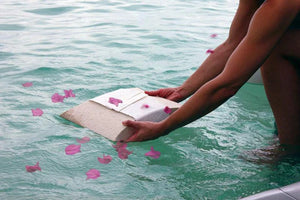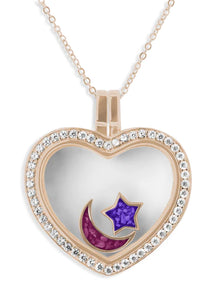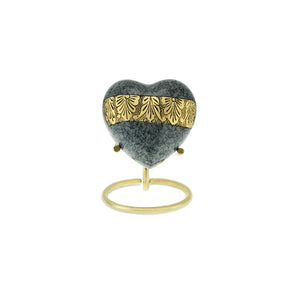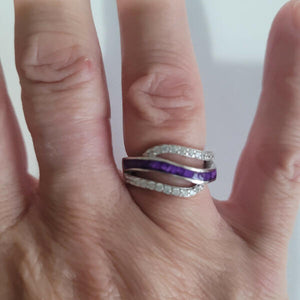Rhodium plating on our Memorial Jewellery

Rhodium plating is frequently applied to pieces of jewellery, and all of our EverWith™ memorial jewellery collection has it. Here, we will explain why, how, and everything you need to know about the process.
What is Rhodium?
Rhodium is a very rare and precious element which appears in the periodic table. It is a member of the platinum metal group, has a silver hue, is highly reflective, very hard and durable, and does not corrode or tarnish. Due to its rarity, it can cost up to twenty-five times more than gold. Rhodium, however, is not suitable to use to make jewellery as it is very brittle and so difficult to form and shape.
What is Rhodium plating?
A thin layer of Rhodium is applied to the jewellery using an electroplating process. The piece to be plated must be completely clean before entering it into the Rhodium solution. Here, an electric current fuses a thin layer of Rhodium onto the base metal. The process takes about half an hour, depending on the thickness of the plating. Rings usually have a plating of about 1 micron, while jewellery that does not receive as much wear can receive about 0.5 microns.
Why apply Rhodium plating?
As it is so hard, Rhodium will protect the base metal from scratching or tarnishing and keep the piece of jewellery looking bright, shiny, and new. Gold is a soft metal which scratches easily, and silver tarnishes with time, so a rhodium plating prevents this. Also, it protects the wearer from allergic reactions to the base metal.
Does the plating wear off?
With normal use, the plating on a ring remains intact for twelve to eighteen months. On pendants and earrings, it will last longer. You will then need to have it replated to keep your piece of jewellery protected and looking at its best. This can be done by a reputable local jeweller and does not damage the resin containing the ashes or the Swarovski crystals.
Care of your Rhodium-plated jewellery
Chemicals can deteriorate the plating, so we recommend removing your ring or using rubber gloves when doing household chores or using any chemicals.
Chlorine in swimming pools can damage the plating, so remove all your Rhodium-plated jewellery before diving in.
Some cosmetics and perfumes can affect the plating, so avoid direct contact and clean away any residues.
Avoid rubbing the plating excessively, for example by constant handwashing.







